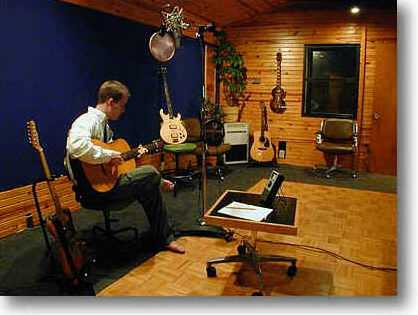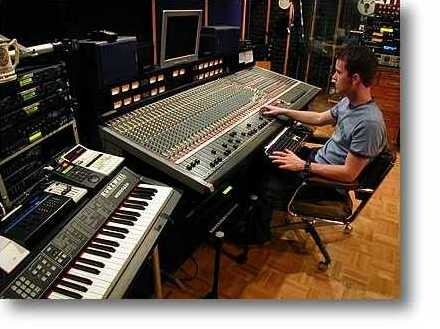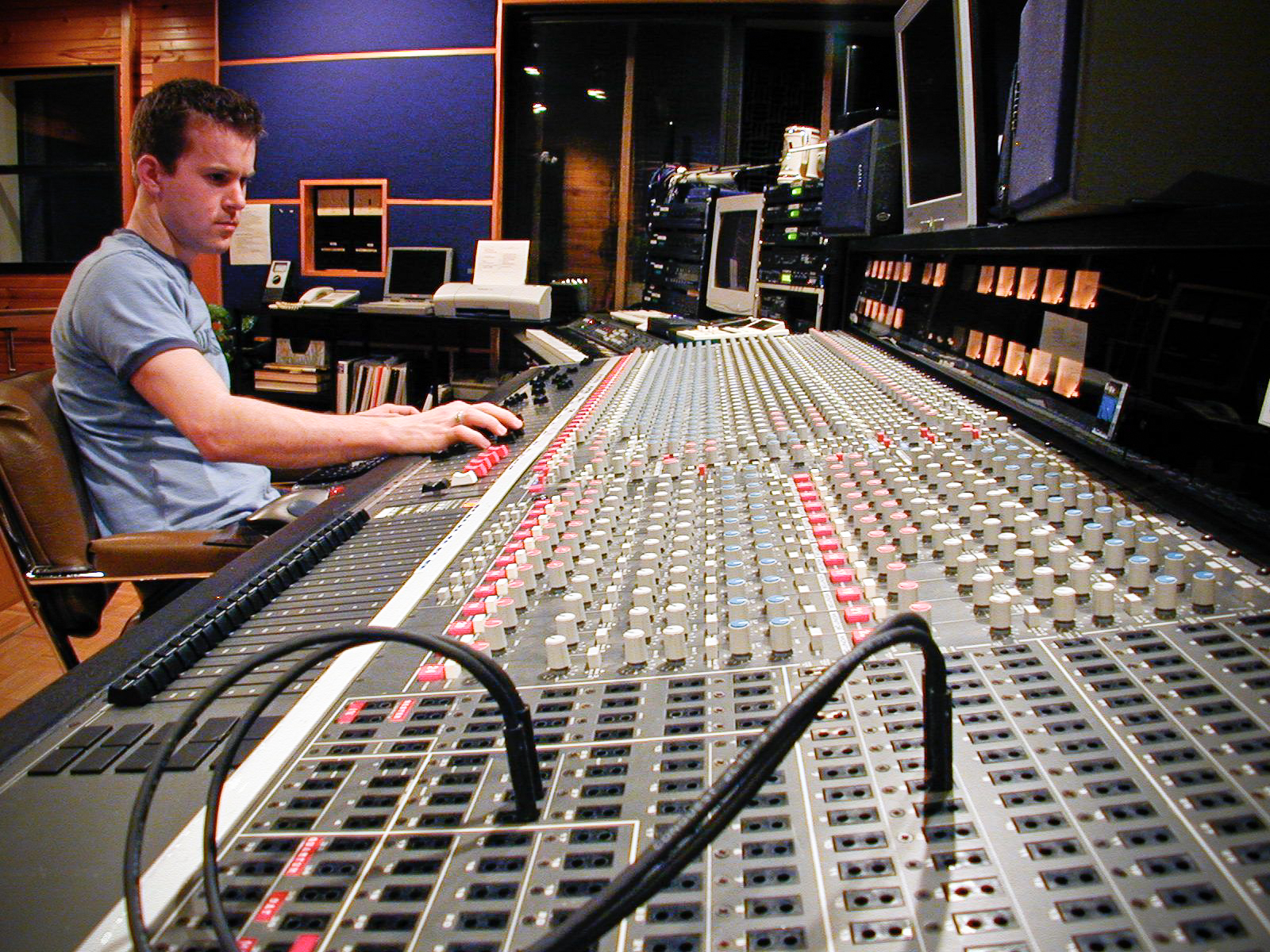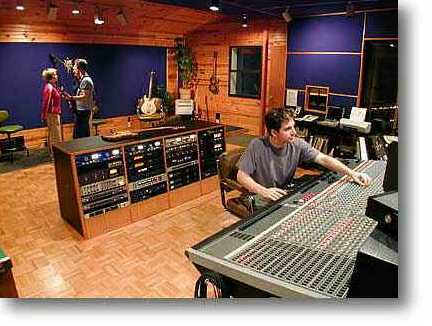How to Choose a Recording Studio, tips and advice. CHOOSING A STUDIO
"How do I choose the right recording studio for my project?"
(Article by Brian Konzelman, Back at the Ranch Recording Studio located near Waco Texas.)

Choosing the right studio for your production can be very confusing, with all the hype and misinformation floating around out there. Your choices range from small home studios to large pro studios, all claiming to be the perfect studio for you. So what do you actually get for your dollar, and what is the best route for you to go?
Here are some tips to help you make a good choice. In my 50 years of recording experience, these four items have always been a part of making the right choice. They are listed in order of priority..........
1. Experience level of the engineer.
This is number one for good reason. A more experienced engineer will do a better job faster than a less experienced engineer. Your engineer will have a greater impact on the sound and cost of your recording than any other variable. Look for an engineer with the most experience working on the kind of product you will be recording (i.e. song demo, radio ad, release music album, etc.) The best equipment in the finest studio will only sound as good as the engineer will allow it to.
2. Suitability of the physical facility
Here is the second most important criteria. Is the facility large enough to accommodate your needs? Your music group must be able to fit and work comfortably in the studio. Check out the acoustic design for your style of music. A huge live room may be required for orchestral sessions, while a smaller dry room is generally used for typical pop music recordings.
Be sure there is a relaxed, pleasant, creative environment in which to work. Remember, you may be there for days on end, so the vibe of the surroundings can have a big impact on your mood.
The acoustical sound quality of the control room and monitoring system is critical. If this item is not up to par, your recording may sound great in the studio, but not translate well into the real world of car stereos and boom boxes, which is critical to the success of your project. A facility that has been designed from the ground up as a recording studio will be more accurate and sound better than retro-fits in existing buildings, homes, or garages.
Are there adequate creature comforts like lounge area, kitchen facilities, seating for everyone, quiet places to get away and polish performances, lyrics, and charts.
3. Quality and Quantity of the Recording Equipment
Surprised that this is not number one? The fact is that a very experienced engineer can make a great sounding recording with not-so-great equipment.
|
Experienced engineers working with the best equipment consistently make the best sounding recordings.
|
Don't be misled by the huge list of equipment offered by many recording studios, as you probably wouldn't need to use 90% of it anyway. It's kind of like taking your car to the mechanic. He has a huge tool chest with hundreds of specialized tools, but will probably need only a select few to get the job done. But the experienced mechanic knows which tool to use, and how to use it correctly.
The staples? The best sounding recordings include the use of high-end mike preamps, a selection of major name microphones, and some classic and high-end outboard gear. Nowadays, the lion's-share of release-quality recordings include the use of hard-disk recording and editing systems like MOTU Digital Performer, or Protools.

Just remember, impressive equipment alone does not make great recordings. But in the hands of a master engineer, great equipment becomes an important component of great recordings.
4. and Last but not Least.....Rates
Surprised again that this is not number one? It is amusing to watch how the hourly rate is usually top priority for newbys, and becomes much lower priority for recording veterans. Here are a few things to consider about rates:
All studios are not created equal. If all recording engineers and studios were equal, then the cheapest hourly rate would be the best value. But in reality, there is a big difference in the quality of product and the speed of production from one studio to another. While the better engineers and studios cost more per hour, they end up using less studio time while producing a better product. So the client ends up with a much better product in less time.
Hourly rates can be misleading. If you are shopping for cheap studio rates, you are certain to find them. If your goal is to find and buy a large quantity of the cheapest studio time, then go for it. If, however, your goal is to produce the best-recorded product for your dollar, you will need to seek out the more experienced engineer in a great facility. In the end, this is always your best value by far.
In a tape-based studio, analog or digital, up to 25% of your studio time will be spent waiting for the tapes to rewind and locate. After every take and punch-in, you will have to wait for the playback. This means that 25% of your studio dollars are wasted, compared to a studio with a random-access hard-disk recording system like MOTU or Protools.
Hourly rate vs. Project rate. Recording veterans seldom do a recording project on an hourly basis. A more efficient approach is to work on a project basis. Discuss the overall goals for your recording project with the studio you would like to record at, and set a reasonable budget for your time and finances. Then produce your project within these parameters. This is the approach used by every major recording artist and record label I have known, because it works so well. Instead of being distracted by watching the hourly rate clock tick off the studio hours, the artist is freed to concentrate on the overall project. For more information, check out our rates and services link
Choose your recording studio based on these priorities;
- engineer,
- facility,
- equipment,
- rates vs. value.

SUMMARY:
- Your engineer will have a greater impact on the sound and cost of your recording than any other variable.
- Be sure the studio facility is a relaxed, pleasant, creative environment in which to work.
- In the hands of a master engineer, great equipment becomes an important component of great recordings.
- If your goal is to produce the best-recorded product for your dollar, remember that a cheap rate is not the same as a good value. My advice is to seek out the more experienced engineer in a better facility.
Visit these links to other pages at RanchStudio.com.....
- HomePage
- Recording Studio Virtual Tour
- Meet Brian
- Mastering
- Rates and services
- Soundbites
- Helpful Links
- Students
- Audio Technology Studies, Recording Studio School info
- Christian Recording Studio
- Contact us
Articles

Share this info with your friends! click on one of the social network icons below.....
